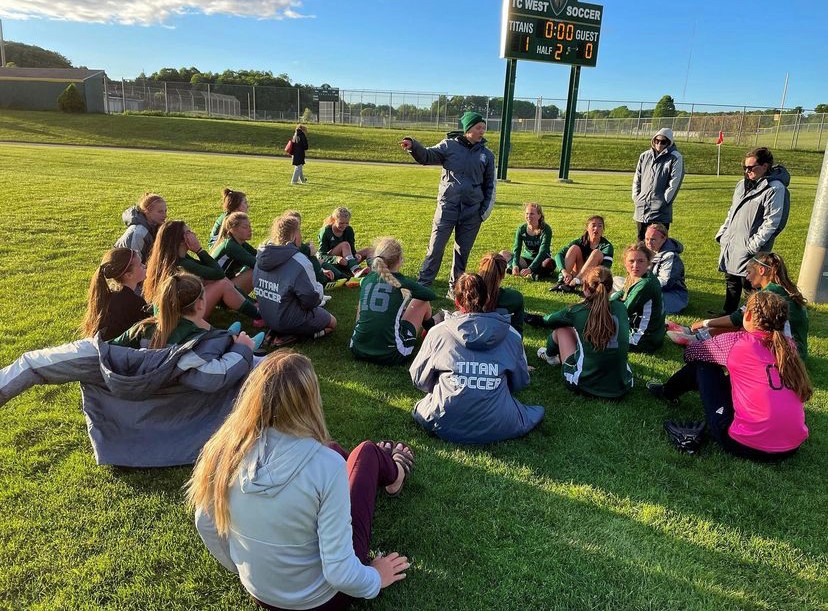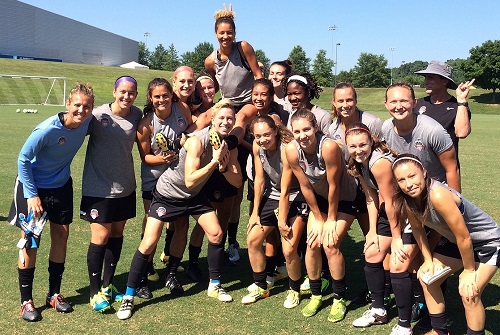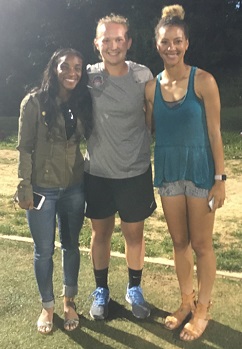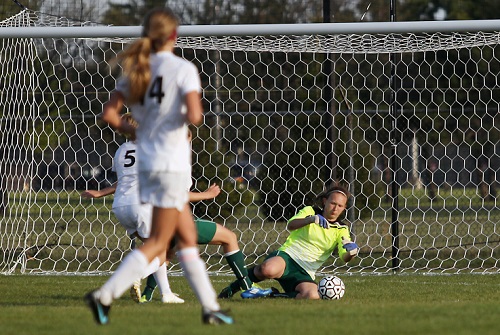
TC West Standout Renews Ties to Titans, Cheers Past Teammates' Gold Pursuit
By
Tom Spencer
Special for MHSAA.com
July 16, 2021
Savanna Wojtanowski was made here. She played here. She stayed here — except for stints in Washington, D.C., where international soccer players joined her.
 Now she’s back as a high school soccer coach.
Now she’s back as a high school soccer coach.
While lots of faces familiar to United States and Canadian television viewers and soccer fans are expected at the Olympic Games in Tokyo, some of those players will be personally familiar to Wojtanowski.
Wojtanowski played alongside a handful of current and recent players on the U.S. and Canadian women’s teams after serving as four-year starting goalie for Traverse City West and during a college career that began with two seasons at Ferris State and concluded with her final two at Michigan State in 2016 and 2017. During her time with the Spartans, Wojtanowski spent two offseasons with the reserve team for the Washington Spirit, one of the original eight teams when the National Women’s Soccer League (NWSL) was formed in 2012.
At West, Wojtanowski was named second team all-conference as a junior and senior, as well as first team all-district, first team all-region and all-state honorable mention her senior season in 2013. West winning the Big North Conference title that spring remains her favorite memory from high school soccer – and she quickly has matched that achievement as a coach, leading West to the BNC championship this past spring in her first season after taking over the program.
Wojtanowski is looking for the U.S. national team to come out with a vengeance after the disappointment of the 2016 Olympic Games in Brazil. There the U.S. fell to Sweden in a semifinal shootout, which meant failing to reach the gold medal match for the first time since women’s soccer was introduced to the Olympics in 1996 in Atlanta.
Sweden is the U.S.’s opening-game opponent July 21 in Tokyo.
“I believe there is a lot of revenge being chased after the Rio Olympics,” the 25-year-old former keeper said. “I was with the Spirit during Rio, and when the team returned from the Olympics, the sense of disappointment was felt for a long time.
 “I believe going into this year's Olympics, we will see a different type of fire displayed from the USWNT.”
“I believe going into this year's Olympics, we will see a different type of fire displayed from the USWNT.”
Wojtanowski won’t see former Washington Spirit teammate Diana Matheson of Canadian fame and Estelle Johnson of Cameroon playing in Tokyo. Matheson recently announced her retirement after 18 years representing Canada’s national team. Johnson and her teammates lost a playoff with Chile for the last of 16 slots in the Olympics.
 Wojtanowski feels fortunate that she had the chance to compete with and against the women trying to claim gold at Tokyo.
Wojtanowski feels fortunate that she had the chance to compete with and against the women trying to claim gold at Tokyo.
“During college I was able to play two years on the Washington Spirit reserves, which opened the door to the pro side of the game,” she said. “I was fortunate enough to be one of two college players training full-time with the pro squad for those two summers.
“Having the opportunity to play alongside some USWNT women and the Canada women was such a great experience.”
Wojtanowski played with current U.S. roster players Crystal Dunn and Kristie Mewis. The current Canadians she played with are Stephanie Labbe and Shelina Zadorsky. Labbe was Canada’s starting goalkeeper in Rio.
Dunn, though, stands out most to Wojtanowski. Dunn was with the Spirit but now plays for Portland. She has 24 goals and 19 assists in 116 appearances for the USWNT as primarily a defender.
“(Dunn) was such a treat to play with …. her humor, attitude, and training mentality is something I will forever remember,” Wojtanowski said. “She was constantly dancing, laughing, and having a great time at training, but when it was time to get serious she would get the job done.”
Wojtanowski also had the tough job of trying to stop U.S. standout Rose Lavelle during Lavelle’s time starring for Wisconsin. The past Badgers standout and now-Washington Spirit midfielder has 14 goals and nine assists in 56 appearances for the U.S.
Wojtanowski began her collegiate career with two seasons at Ferris State University. After transferring to MSU, she played two more seasons and as a junior in 2016 tied the MSU single-game record with 14 saves against then-No. 16 Penn State. She earned a bachelor’s degree in business with a focus on administration and management and a master’s certificate in supply chain management and procurement. She returned home to start the next chapters of life, and she works as a supply chain buyer fulltime along with her guidance of the Titans.
She’s thrilled to be back at her high school alma mater, which she guided to an overall 10-4-1 record this spring, with the Titans eventually falling to Midland Dow in a Division 1 District Final.
 “I wanted to give back to the community,” said Wojtanowski, who previously had coached at the club level in Lansing. “West has always had a very special place in my heart ever since graduation.
“I wanted to give back to the community,” said Wojtanowski, who previously had coached at the club level in Lansing. “West has always had a very special place in my heart ever since graduation.
“When this opportunity presented itself, I knew I had to take the opportunity to be a Titan again,” she continued. “It has been a special experience to coach the program that I grew up with.”
Wojtanowski wants to instill a family-based culture in the Titans program, something she came to know and love while at Michigan State.
“The biggest thing for me is growing them as individuals both on and off the soccer field,” she said.
Wojtanowski believes girls high school and women’s soccer in this country have changed for the better since she played. And, she’s not the least bit surprised by the consistent success of the USWNT.
“The women's game in the US has grown significantly since I started playing soccer in 2000,” Wojtanowski noted. “Our farm systems here in the U.S. along with club, college, and other programs feed a constantly-elite level of players through the USWNT system.”
2020-21 Made in Michigan
July 8: Caro Champs Find Common Ground Again as Mental Health Providers - Read
June 28: Michigan's Minor Leaguers Making Up for Lost Season - Read
PHOTOS: (Top) Savanna Wojtanowski leads a halftime discussion this spring with her Traverse City West varsity. (Middle) Wojtanowski, second row standing far right in group photo, trained two seasons with the Washington Spirit’s reserves; the Spirit first team included U.S. national teamer Crystal Dunn (left in second photo) and Cameroon national teamer Estelle Johnson (far right). (Below) Wojtanowski makes a save for West against Traverse City Central in 2012. (Top photo by Daisy Kinney, middle courtesy of Savanna Wojtanowski and below courtesy of the Traverse City Record-Eagle.)

MHSA(Q&)A: Soccer Coaches President Zach Jonker
September 21, 2012
By Geoff Kimmerly
Second Half editor
Zach Jonker has had his hands – or, perhaps, feet – on just about every facet of soccer in this state over the last 20 years.
 He played on a Class B Semifinalist at Petoskey before graduating in 1995, then earned four letters and served as a captain at Hope College. He came back home to teach social studies and became coach of both boys and girls varsities that are regularly among the northern Lower Peninsula's elite, but also are highly-regarded statewide. And this fall, he began the first of a two-year term as president of the Michigan High School Soccer Coaches Association.
He played on a Class B Semifinalist at Petoskey before graduating in 1995, then earned four letters and served as a captain at Hope College. He came back home to teach social studies and became coach of both boys and girls varsities that are regularly among the northern Lower Peninsula's elite, but also are highly-regarded statewide. And this fall, he began the first of a two-year term as president of the Michigan High School Soccer Coaches Association.
So he can speak first-hand on the benefits of playing high school soccer in Michigan, which is good news to get out perhaps now more than ever. Michigan high school soccer is facing a predicament unlike any it has tackled before – the creation by U.S. Soccer of its Development Academy, a set of travel teams all over the country that train nearly year-round and are meant to eventually fuel the men's national team. That opportunity has drawn a number of top Michigan players out of high school soccer.
Jonker and his coaching brethren are monitoring that situation closely, while continuing to lead their teams into the second half of this fall boys season. His Northmen are 6-7-1 overall this fall, but have faced three of the top-five ranked teams in Division 1 and another from Division 2.
Despite your location near the tip of the Lower Peninsula, you still manage to schedule strong competition. How do you make it work?
We’re in a really nice spot. Traverse City hosts a tournament during the regular season with Traverse City Central, Traverse City West and Petoskey, and then they invite three schools from downstate that have generally been (Warren) DeLaSalle, Clarkston and Ann Arbor Skyline. The following weekend, we host a similar format with Rochester Hills Stoney Creek and Bloomfield Hills Lahser. We get six really good games at the start of the season with two tournaments. It’s early in the season and teams love coming up, making a weekend out of it, hitting the beach and doing some bonding. And the fields at Traverse City and Petoskey are both beautiful, which helps teams commit, plus the three of us are very competitive.
We’re coming down next weekend to play East Lansing, and we always schedule a couple of those. Last year, Mason came up here. It’s definitely a commitment in terms of travel during the course of the year, but from a Petoskey standpoint, I don’t care about our nonleague record. We’re using those games to get better for our league and better for the (MHSAA) tournament. The only tough thing is putting that in perspective for the kids.
What is something happening in high school soccer that the coaches association is proudest about right now?
We’re always looking at it from the other side, what we want to make better. But one of our main goals as an association is to properly recognize players. And I think the process we have in place for giving all-district, all-regional and all-state recognition and ultimately the selection of the Dream Team, I think that’s a very good model that enables us as an association to truly recognize players who put the work in and had a successful season. We also redesigned our web site this past season, and we’ve done a lot of the all-state process online, which a lot of coaches really liked because it cut down travel time for meetings.
Is anything new on the horizon?
A lot of coaches are really interested in seeing what the long-term impact of the (U.S.) Academy ruling is. Everyone’s initial take is we’re seeing increased parity round the state as the result of 120 kids electing not to play high school soccer this year. Obviously, all of those players are good players playing at a high level, and people are interested in seeing at the end of the season if kids are going to have missed playing in front of their communities, and if kids are going to migrate back to high school soccer. There’s talk of U.S. Soccer adding a U-14 academy. They’re trying to expand.
What has been the reaction so far to the U.S. Academy?
For certain players, the academy makes sense. They’re in a professional training environment 10 months out of the year. But those guys not on the professional track would be equally served by playing high school soccer and playing club like we always have. (U.S. Soccer) is doing a lot of this to benefit the top one percent of players. It’s the main frustration from the coaches.
Everyone kind of understands why U.S. Soccer is headed down that path, and it impacted each (high school) team differently. Some programs lost upwards of 8-10 kids as a result. Some didn’t lose any.
In terms of geographic parity, we’re already seeing that. Two years ago, west side teams won all four championships. Last year, Detroit teams won all four. Now we’re going to see more parity within districts, within conferences. And I think we’ll see scores closer than in the past.
What role should high school soccer play compared to club, the academy, etc.?
I equate it as playing for your national team. When you put your school colors on, go out with your friends that you’ve played with since kindergarten, it’s really special. They can’t even begin to match the rivalries we have with high school soccer, the amount of passion that exists within our game and the number of fans that show up at these games. At an academy game, you might have a handful of parents on the sideline, that’s it, and a few college coaches watching. But you can’t match the high school experience and the passion that exists. Kids are going to miss that, and we’ll get kids back because of that.
Do your players see an MHSAA championship differently because so many elite players aren’t participating in high school?
It doesn’t even register with these guys. The (MHSAA) championships are going to be awarded in November, and for whoever wins this year, it will be just as meaningful for these guys as the guys who won last year.
Does soccer get a bump from U.S. national team success like swimming or gymnastics might during Olympic years?
Any time it’s a World Cup year, men’s or women’s, the players get really excited about the experience. It gets them enthused to get out and train. I don’t think kids watch enough soccer in this country, and that’s one of the big issues we have. Ultimately, what’s holding us back at the national team level is kids are not growing up in a culture of soccer on television like in other countries against which we compete. In a World Cup year, kids get excited, and they watch more soccer, and the play is better on the field.
How much has high school soccer changed since you played?
There are just so many more layers of sophistication, tactically. We had good athletes playing at that point, and we have good athletes playing now. But as a country, we’ve evolved from a coaching standpoint. The kids are getting better technical training at a younger age, and are much better tactically. There are many more teams now emphasizing more possession-based (play). What else has helped the evolution is getting off playing on football fields. During the (19)80s and 90s, a lot of games were played on them, and it made it hard to possess the ball when the turf was chewed up. Soccer-specific fields have helped the game evolve.
What will Michigan high school soccer look like five years from now?
I like the path we’re headed down. The number one thing going forward is seeing what happens with the evolution of the academy program – do kids come back, or does the academy program grow? Regardless, the kids playing high school soccer are going to have a great experience, and there are a lot of really good coaches in high school soccer, a lot of really great referees and administrators. That makes the game special. I see us continuing to have the best going forward.

PHOTO: Petoskey senior Noah Honaker goes high while surrounded by defenders to head a ball during a game this season. (Photo courtesy of Dean Viles.)

